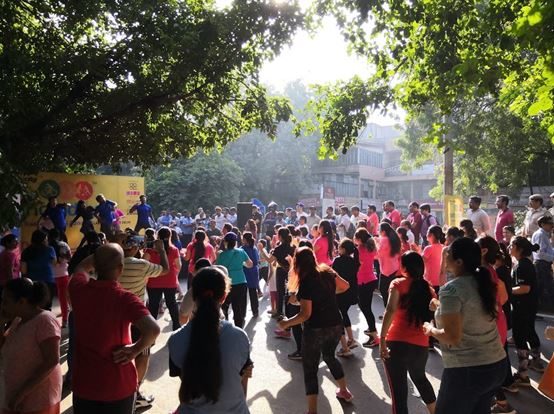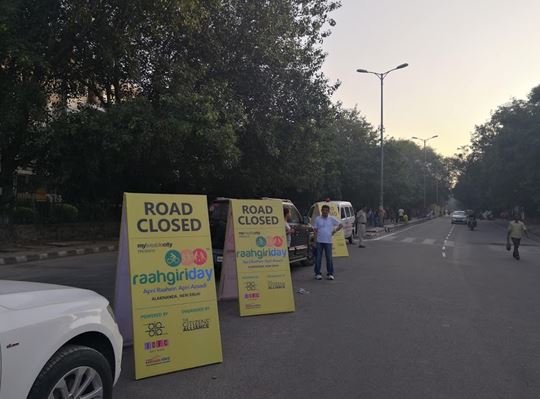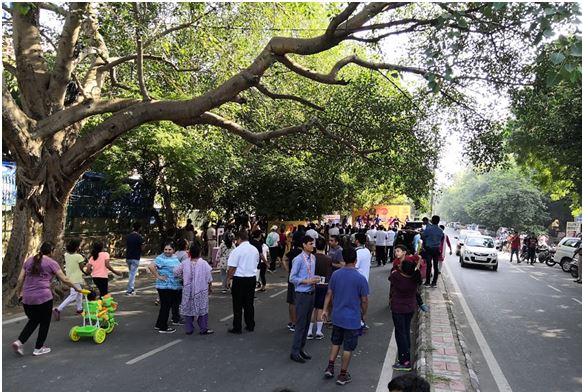Raahgiri shows the way, again
 The Raahgiri Dance
The Raahgiri Dance
On Sunday, residents in the South Delhi area of Alaknanda were in for a pleasant surprise. Early in the morning, there was a noticeable amount of movement at a key arterial road in the area, with a section of the road being cordoned off. For passing motorists, it was a mild inconvenience at best, as traffic was diverted to the other road, making it a two way stretch for those precious 500 metres or less that was cordoned off.
Any inconvenience they faced was shrugged off when they realised why this had been done. Raahgiri had finally landed into this area, with all its attendant freedom to own the roads for a precious few hours. It was a time that residents utilised with amazing gusto, right from children sketching and drawing ‘art’ on the road to impromptu races, an opportunity to cycle outside the confines of gated complexes for younger adults and for the adults, some energetic Yoga, Zumba and other options.
Best of all, the whole effort was organised almost wholly by the efforts of citizen organisations active only in the area, which did the hard running of generating support from local agencies like the police. Politics took a backside too, with most local politicians, cutting across the political spectrum, marked attendance, without any speeches, grandstanding or associated hangers on. By the time the event ended, almost 3 hours after the first public calls to join in, over 3000 area residents had joined in to participate and enjoy the ‘freedom’ to walk, cycle, or simply sit and chat in a public space. For some of the older residents, it was an amazing throwback to a time when the city was more accomodating of their needs to do such simple acts peacefully, without running into constant obstacles. For the young adults and children, it was a glimpse into the world beyond their homes and complexes, a novel realisation of the fun and joy they miss out on, just because their cars, and roads have become positively dangerous and encroached on every possible public space for ordinary citizens.

For many, it was an opportunity to meet not so distant neighbours and friends in a social environment that was pure fun. These are opportunities that create better neighbourhoods, a more cohesive society and happier people. So why don’t we see more of this?
As cities struggle to cope with the explosion in private transport, and its attendant demands on public spaces, thanks to poor planning, these Raahgiri events remain the strongest demonstrators of the possibilites that exist, and the action that needs to be taken. Our failure to create a robust public transport framework, and networks across cities had led to massive costs to everyone, besides the damage to the environment. No land scarce country like India has actually moved ahead, or can hope to, without a concerted effort to involve its citizens as Raahgiri does, and follow up by real action on the ground to make the break from traffic longer and sustainable. How many of the many state governments in the union, benefiting as they have been from the fuel taxes, have pledged to invest the extra money in public transport? None, sadly. Even as the extra money earned by states since Aug 15, to take a recent benchmark, is already in excess of Rs 9500 crores, and counting! Even the states which have cut back on their tax rates recently have only foregone some of the additional revenues, not their base earnings. At current prices, the full year gains for state governments, as compared to 2017-18, is likely to be over Rs 45,000 crores by March 31, 2019. Remember that next time you hear your state government put the blame for high taxes squarely on the central government.

Across India, forget bicycle tracks, even pavements area rarity, taken over as they are by vehicles, petty street side businesses and worse. Our planners have failed us, when it comes to creating pubic spaces, with Ms Mayawati of the BSP coming out strangely as the only national leader who ended up creating some spaces, perhaps unintentionally, when she opted to make those giant monuments to Dalit empowerment in Uttar Pradesh. A Raahgiri celebration has become one of the best ways to return the streets to the citizens, and build on this new opportunity to engage with the local community for the government as well as everyone else. Here’s wishing the movement spreads some sense into the minds our of our planners and administrators, who have shown a remarkable propensity to find ever new ways to cut out more and more private spaces for themselves at the expense of pubic spaces. Be it the wanton tree cutting for so called public projects like the government housing scheme with select access, or the many elevated route alignments for the metro, which seem to have a special affinity to replacing the green lungs of the city with metro stations or tracks.
Raahgiri at Alaknanda. This is yet another initiative by area residents to create public spaces for wider interactions. A small stretch of road has been cordoned off for 3 hours, when children and adults can all enjoy the outdoors, an escape from the tyranny of traffic 🙂 A special shout out to Sreekant Khandekar for doing a lot of the hard running here!
Posted by Prasanna Singh on Saturday, September 29, 2018




